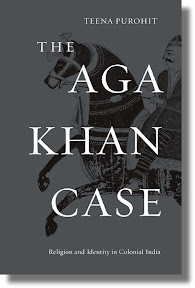Purohit: The Aga Khan Case
Purohit, Teena:
The Aga Khan Case : Religion and Identity in Colonial India / Teena Purohit. - Cambridge, Mass ; London : Harvard University Press, 2012. - x, 183 S.
ISBN 978-0-674-06639-7
US$ 45,00 / £ 33,95 / EUR 40,50
DDC: 344.547096
Beschreibung
An overwhelmingly Arab-centric perspective dominates the West’s understanding of Islam and leads to a view of this religion as exclusively Middle Eastern and monolithic. Teena Purohit presses for a reorientation that would conceptualize Islam instead as a heterogeneous religion that has found a variety of expressions in local contexts throughout history. The story she tells of an Ismaili community in colonial India illustrates how much more complex Muslim identity is, and always has been, than the media would have us believe.
The Aga Khan Case focuses on a nineteenth-century court case in Bombay that influenced how religious identity was defined in India and subsequently the British Empire. The case arose when a group of Indians known as the Khojas refused to pay tithes to the Aga Khan, a Persian nobleman and hereditary spiritual leader of the Ismailis. The Khojas abided by both Hindu and Muslim customs and did not identify with a single religion prior to the court’s ruling in 1866, when the judge declared them to be converts to Ismaili Islam beholden to the Aga Khan.
In her analysis of the ginans, the religious texts of the Khojas that formed the basis of the judge’s decision, Purohit reveals that the religious practices they describe are not derivations of a Middle Eastern Islam but manifestations of a local vernacular one. Purohit suggests that only when we understand Islam as inseparable from the specific cultural milieus in which it flourishes do we fully grasp the meaning of this global religion. [Verlagsinformation]
Inhalt
Acknowledgments. ix
Note on Transliteration. xi
Introduction. 1
1. Prehistories of the Isma‘ili Sect in Nineteenth-Century Bombay. 18
2. Sectarian Showdown in the Aga Khan Case of 1866. 35
3. Reading Satpanth against the Judicial Archive. 57
4. Comparative Formations of the Hindu Swami Narayan “Sect”. 87
5. Sect and Secularism in the Early Nationalist Period. 111
Conclusion. 133
Notes. 141
Index. 175
Autorin
Teena Purohit is Assistant Professor of Religion at Boston University. Profile page.
Quellen: Harvard University Press; WorldCat; Amazon; Library of Congress
Bildquelle: Harvard University Press
Bibliographie: [1]
References
- (2012). The Aga Khan Case: Religion and Identity in Colonial India. x, 183 S.
Ähnlich
- Warfare, Religion, and Society in Indian History
- Sevea: The Political Philosophy of Muhammad Iqbal
- Missionary Discourses of Difference
- Religion, Science, and Empire
- The East India Company and Religion
- Colonial Voices
- Mixed-Race and Modernity in Colonial India
- Shi'a Islam in Colonial India
- Codification, Macaulay and the Indian Penal Code
- Ritual, Caste, and Religion in Colonial South India

